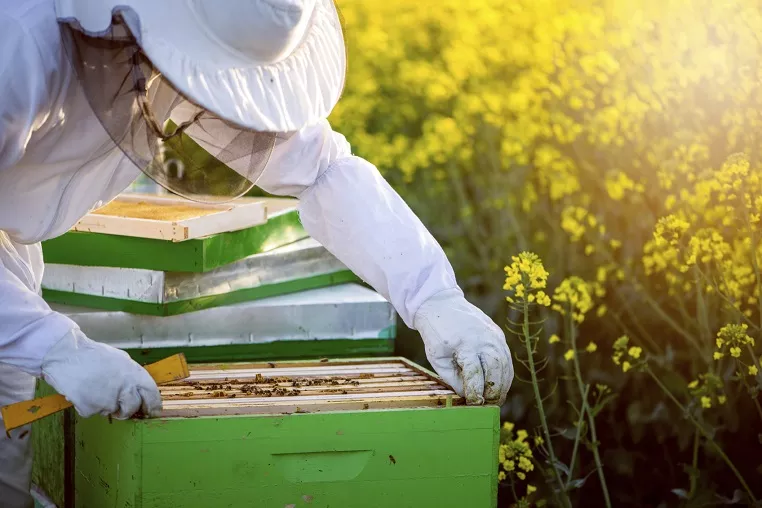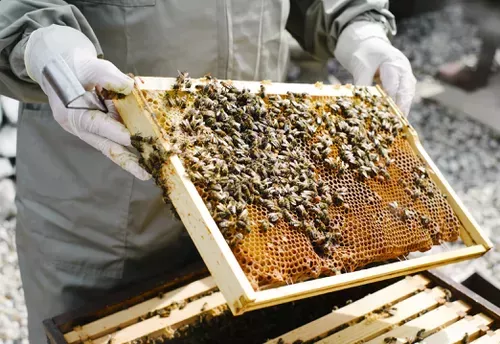Harvesting honey from a new hive is a milestone every beekeeper looks forward to! After hours of research and choosing the ideal equipment, you’ve waited for the weather to pick the perfect incubator location for the bees to come in and take care of. Now you wait…but how long will it take for you to harvest the first sweet honey from your new hive?
Typically, a certain amount of honey can be harvested from the new hive within four to six months after the colony is introduced into the hive. However, I recommend not harvesting at all or limiting it to a minimum during the first season.

As you might have guessed, beekeeping and honey collection are not all that simple. Some beekeepers prefer to harvest honey from new hives earlier than others. I believe it is best to wait a season before starting to harvest this delicious honey. Let me tell you why.
In The First Year, All The Honey Belongs To The Bees
At least my goal for building a new hive is simple – to build a colony strong enough to produce honey for many years to come. If you have the same goals as me, I recommend no or very little honey for the first season.
The reason is simple – the bees need to produce wax and “pull out” the hive. This alone consumes a lot of energy. The colony needs the queen’s comb to lay eggs and make the whole family stronger.
The speed at which bees build their hives depends on the hive’s geographic location, availability of flora and weather. If you live in the South, have lots of hives around your beehives, and are supported by sunny weather, you can harvest honey without disrupting the colony. However, if you skip the first year and wait until the second season, your hive will have more time to build and become stronger. As long as the colony is well established, future harvests will not last.
How To Use A Beehive Entry Reducer And Do We Need It?
How Much Honey Can Be Produced By One Bee Colony?
The average hive produces about 25 pounds of honey per year, but in good seasons, yields can be significantly higher. Under ideal conditions, a single hive has the potential to produce more than 50 pounds of honey.
When you’re ready to pick honey from your new hive, it’s important to make sure you have the necessary equipment, and you should allow at least three hours for this task. You may want to stop the day because you are learning a new skill. Eat only excess honey to ensure your precious bees survive, don’t be intimidated by the weight, honey is actually heavy. Also, harvest honey carefully without harming the bees, see my post How to Harvest Honey for more information.
It is important to emphasize that bees do not hibernate and in winter they feed on honey stored in their hives. Therefore, it is important that you only remove the excess when harvesting. If you ingest too much, your bees won’t survive, and you’ll start the season with a tired colony. You can read more about bees’ survival in winter in my post – Do bees hibernate?
The stronger your bees, the higher your yields should be. Generally, you can expect as much or more of the harvest at the end of the second season as in the first year.
Do Bees Sting At Night And Why Do They Do It?
Factors That Prevent The Extraction Of Honey From New Hives
Bees diligently gather nectar; you wait patiently for what they need; now it’s time for a sweet reward! Are you wondering what is causing your honey production to be close to zero? You’re not alone; many first-time beekeepers experience unexpected results when trying to get honey from their first hive. These are the most common reasons why the amount of honey in a new hive may be less than expected:
- Poor choice of hive for your bee colony, e.g. hive too small, poor hive quality.
- Place the hive where it doesn’t get enough sunlight – Giving the hive enough sunlight and space (at least 10 feet) is critical to its success.
- It is easy for novice beekeepers to make small mistakes that affect honey production. When I first started, several beekeepers recommended me several books that accelerated my beekeeping journey and saved my bees many times over. These are Beekeepers for Dummies (see prices and reviews here) and the Beekeeper’s Bible (see prices and reviews here). They are very low cost but great value.
- New colonies do not have enough food – when you first get bees, you may need to replenish their nectar with sugar water. Usually after transport, the bees are weak, exhausted and need a boost to get started!
- Waiting too long to harvest – lower temperatures can cause the honey to thicken, making extraction very difficult.
- Not waiting long enough to harvest – if the bees don’t cover the cells of the hive with wax, the honey will turn watery and spoil. The water in the nectar takes time to evaporate. Moisture and honey are not friends.
- Harvesting too much honey – not leaving the bees with the reserves they need to survive the winter could put your colony at risk.
If you’ve made any of the above mistakes, then you’ll want to fix the situation. Some bugs are easier to fix than others. For example, if you’re not feeding enough bees, be sure to do so this time. If you must move the hive, do not do so until all necessary safety precautions have been taken. The last thing you want is a swarm of angry bees chasing you! You want their energy to flow into your second harvest.

How To Store Honey After Honey Extraction?
As a new beekeeper, you may be wondering what to do with all the honey you just harvested. Maybe you’re a little shocked because you can’t imagine what 15 pounds of honey-like amber honey looks like before it’s extracted from the hive. You should cover it and remove it immediately from the area where the hive is. Otherwise the bees may try to retake the honey! Can you blame them after all their hard work?!
Honey is one of the few foods that doesn’t spoil in its natural state, but ideally you should find a cool, dark place for long-term storage. It is also important to keep track of storage containers that are free of moisture and ready to be filled. If you’re shopping in bulk, make sure you have somewhere to store extra containers. Once you fill your container and find a place to store it, you face a (positive) dilemma – how much honey do you keep for yourself and how much do you share? Only you can make this decision! Of course, if you get help with the harvest, you want to send your helper home. They’ll appreciate it, and who knows, they might even help again next time.
What Are Mining Bees And Do They Sting?
How Much Honey Can We Expect When A Bee Colony Strengthens?
As long as your hive is healthy and your bees are working happily, your hive should thrive for years to come! You’ll move on and still worry about buzzing little bees from time to time, but rest assured that with care and regular attention, your colony will grow stronger and the amount of honey you can harvest will increase your weight. You can usually harvest honey from their hives more than once per season. But you need to be aware of several factors that affect honey production:
- Climate – warmer climates have longer seasons and more harvest time
- Region – While beekeeping is not uncommon in urban areas, honey can take longer to accumulate
- Local flora and fauna – hives in rich areas tend to yield more honey
- Bee loss to other hives – While you can take steps to protect your colony, you can’t always stop some bees from migrating!
- Robbery – Make sure to harvest before the bees start eating their own honey.
Strong Colonies Mean Good Results In Beekeeping
I really hope the fact that you don’t harvest too much honey in the first year doesn’t discourage you. Instead, the key to successful beekeeping is building and maintaining a strong colony. So getting the bees to do their job in the first year is an investment. Your bees will thank you and bring sweet rewards for years to come! Check out this article here for other important things new beekeepers should know as they get started.
